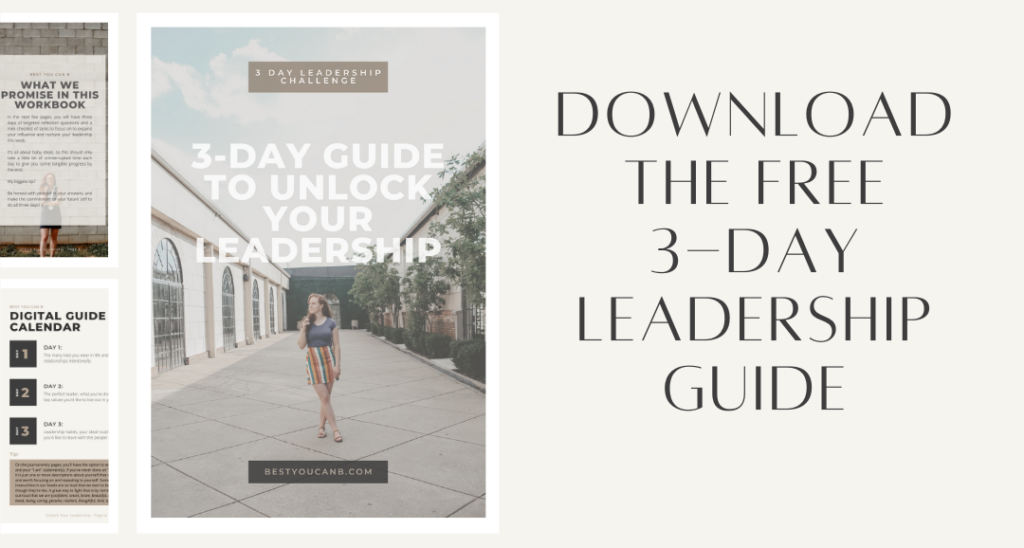Chronic Pain and Leadership: How to Thrive and Inspire When it Hurts
Many of us have either chronic pain, chronic illness, emotional baggage, heartbreak, or repeated frustration that feels like we are sometimes walking with heavy chains dragging behind our feet and keeping us from fully living life.
That heaviness and emotional burden from chronic struggle can seep into every other aspect of our life to limit our joy, fulfillment, and, of course, our leadership!
Tune in to the full episode here!
Listen to the episode on Apple Podcasts
On Chronic Pain & Leadership:
If you think about what it means to be a great leader, you have to be others focused, but if you constantly have this pain that is drawing your attention away from others towards yourself and what you’re struggling through, then all of that energy that you really want to be putting into the people around you just goes towards something that you might be completely out of your control.
How can we control what we can control when chronic pain seems to take over? How can we keep what we cannot control in a healthy perspective? Lastly, how can those long, drawn-out seasons of difficulty potentially be the best thing that ever happened for your leadership?
At the time I’m writing this, I am 24 years old, and over a decade of my still young life has been very much full of chronic pain. Chronic pain to me is going to be very different from chronic pain to someone else. There is no use in comparing your journey with anyone else’s because it is, well, yours! 🙂
RELATED: Emotional Leadership & Why You Need It
For me, it has been something called Chronic Exertional Compartment Syndrome, with a few other issues sprinkled in along the way. What started as minor pain turned into neverending “shin splints,” or so we thought. Fast forward and much of my highschool years blur together simply because of the pain seeping in uncontrollably through both my lower legs into class, friendships, sports practice, you name it. My senior year of highschool, I had surgery on both legs, and had the same surgery again after graduating college.
I’m skipping a lot of the tears, frustration, and pain, but would I trade it for the world? Absolutely not.
Here’s why:
One: I’ve learned to control what I can control by starting with the basics.
How are you protecting and prioritizing your sleep? How are you being disciplined to get to bed at a reasonable hour so that you’re giving your body that simple (but often overlooked!) necessity in any type of healing?
Head over to Episode 17 if you want some great tips on nutrition, because she definitely has a ton of credibility and really knows her stuff. Nutrition is critical for anyone experiencing chronic pain or chronic stress, or honestly really just anyone! When I was in high school learning how to juggle all of the leg pain I was experiencing, I actually began to experiment with nutrition a lot. I cut out dairy and gluten to see if it would make me feel better, and it actually gave me a ton more energy!
De-stressing looks different for everyone, and chronic pain can mean that your brain is working overtime to pay attention to where you’re needed in a given day but ALSO to pay attention to the pain, the feelings of sadness, anger, bitterness that can often be coupled with that. We need to remind our bodies, “Hey, it’s ok, we’re going to make it through this you can relax!” And in order to do that, we have to intentionally provide those reminders every once in a while by reading a book distraction-free for 20 minutes, going for a walk without a phone, or taking a salt bath to restore magnesium.
What you’re learning and filling your mind with is also totally in your control.
And so is an attitude of gratitude! I like to think of gratitude as maybe not a cure-all, but definitely a cure-a lot! Misery loves not just company, but especially more miserable company. I feel like when I’m being negative, what follows is more negativity, so breaking that cycle means I need to interrupt my thoughts with some thankful perspectives and positivity!
Two: I also learned that, of course, there are things I cannot control. I personally have a faith-based perspective in how I address that. I approach chronic pain, any loss, regret, shortcoming, frustration with: God is in control and I’m not. He has a plan for me to prosper and flourish and if I hang in there long enough, I end up realizing in hindsight “Oh! That’s why I went through that.”
Something useful here is journaling, because if we journal about what we are experiencing while we can’t see the light at the end of the tunnel, then we will have the opportunity later on to look back on what we endured and see all the glimmers of hope; all the areas where prayers were answered and we made it through.
Three: And the last thing I learned is that all the negativity that comes from chronic pain and struggle has become one of the best things to ever develop my leadership. If you’re open to that perspective, then it can do the same for you too.
What if what you’re going through right now is increasing your threshold to actually have to go through something harder later on in life?
What if what you’re going through right now is increasing your capacity to handle more down the road with ease compared to now?
Maybe this is teaching you the importance of creating and valuing a support system, or maybe you are learning what you’ll need to give to others in order to provide the support they need.
Whatever the case, you are gaining invaluable insight into the difficulties experienced by people who might really look up to you and how you can best serve them, because you understand more than the average person might about their chronic pain.
What a blessing! There’s more where that came from, too.
I tend to see my chronic pain as a temptation to focus on me, myself, and the pain. I’m so thankful to have so many opportunities to practice ignoring my self-centered tendencies (which we all have!) to say “no!” to that, and “yes!” to focusing on others instead.
I’ve fallen into that trap many times and I want to encourage you not to.
I promise that your chronic pain and difficulty is only made worse by dwelling on it in a sorrowful way. Yes, spend time trying to solve the problem and go see more doctors. Yes, reach out for help when you need it. But save your energy to pour it into the things you can control and to have a good perspective on the things you can’t. Save your time to go towards allowing this season of your life to grow you and stretch you into a better person with stronger character.
And, of course, repurpose your pain into a newfound and unique-to-you leadership skill to bless and serve other people who need the understanding and empathy you can give to them.


April 20, 2021
Be the first to comment